A recent police study puts Mumbai on top of the national charts in methodically disposing unclaimed bodies. Ground realities, however, tell a different, and disturbing, story
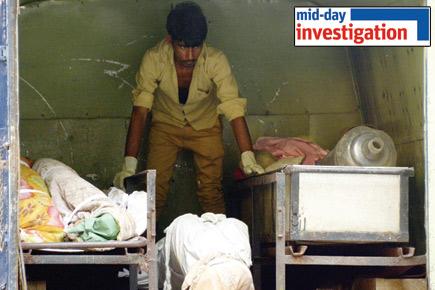
 On the morning of March 13, the air-conditioning at Crawfort Market's GT Hospital morgue malfunctioned. There were five male bodies inside. As the humidity rose, the human flesh began to rot, and the stench spread. People in nearby homes got uncomfortable and complained to the hospital.
On the morning of March 13, the air-conditioning at Crawfort Market's GT Hospital morgue malfunctioned. There were five male bodies inside. As the humidity rose, the human flesh began to rot, and the stench spread. People in nearby homes got uncomfortable and complained to the hospital.
ADVERTISEMENT
On March 16 — more than 72 hours after the AC conked off — mechanics were called in. They inspected the mortuary and detected a leakage in the units. It would involve major repairs. It would take time. The GT Hospital authorities immediately informed civic officials that they would not be able to take any more dead bodies for the time being. All cases were to be sent to the JJ Hospital.
Also read: Giving dignity to the dead: One man's fight to bring change
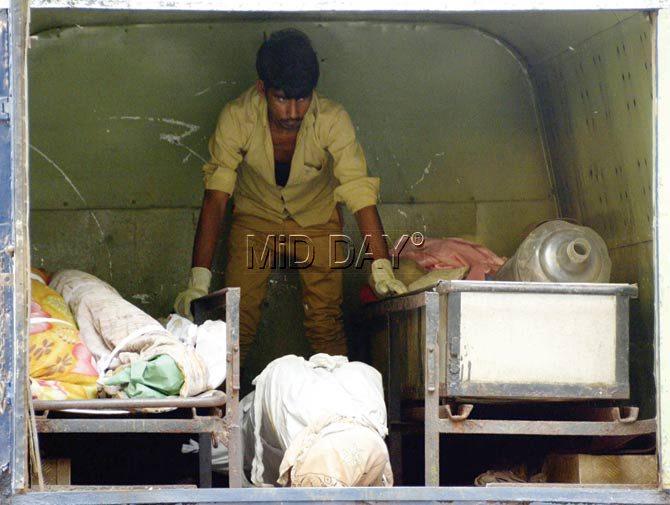
Rizwan, 30, a helper to constable DP Ware, readies to offload unclaimed bodies from the hearse at Bhoiwada cremation ground. He earns R100 per body for the job. Pics/Pradeep Dhivar
The nearby Azad Maidan police station was also informed.
At the police station, it was time to call Mumbai's Mr. Wolf. Like the character immortalised in Quentin Tarantino's seminal Pulp Fiction, police constable DP Ware disposes of the dead. Unlike Mr. Wolf, Ware doesn't get paid handsomely for his sub-human troubles. He is among a handful of men in Mumbai who are tasked with disposing of the dead.
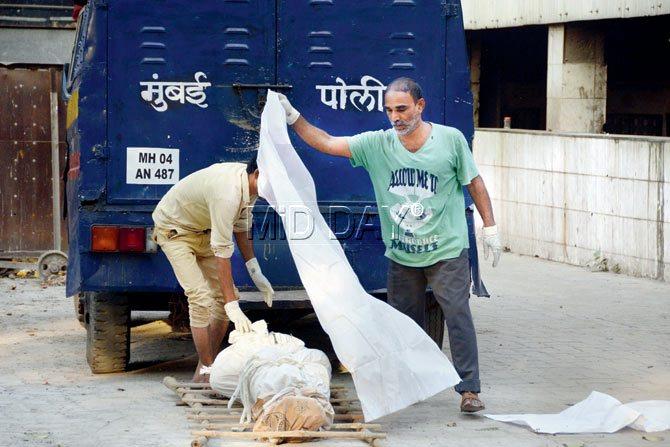
Rizwan and Kaniya Solanki place a shroud over a corpse at Bhoiwada crematorium. Of the 12 hearses once available for transport, only three are functioning. Pic/Pradeep Dhivar
Soon after the call, Ware and his two aides — Kaniya Solanki, 38, and Rizwan, 30 (he goes by his first name) — arrived at GT hospital on the police hearse.
On paper, Mumbai tops the national charts in disposing of unclaimed bodies. In fact, a high-level team of officials from the Bureau of Police Research & Development (BPR&D) were in the city recently to understand the methodology.
The visit was the result of the efforts of one man. Activist Vikas Chandra from Patna had obtained nationwide information from countless RTIs and filed a PIL in the Supreme Court regarding how the country handles unknown dead bodies. As per the information given to him under RTI, Mumbai seemed to have the best record. Hence, the BPR&D team's visit to the commercial capital. The contents of BPR&D's report are not known. The case will come up for hearing before a bench of Justices Dipak Misra and Shiva Kriti Singh on April 1.
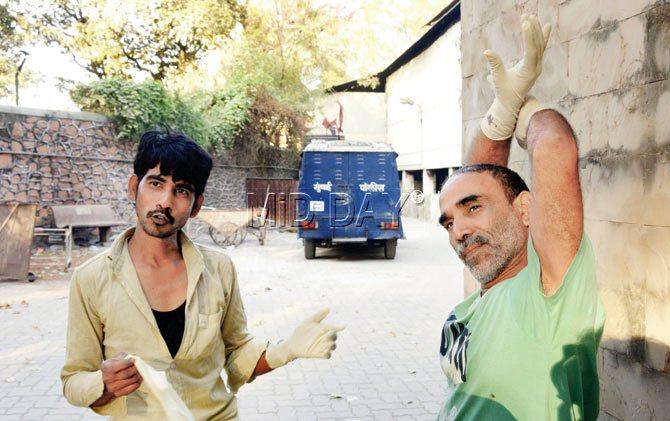
Rizwan and Kaniya Solanki
Resources lacking
Till some time ago, all 12 of Mumbai's police zones had a hearse each to transport unclaimed/unidentified bodies. Today, only three police hearse vans are available for the city's 94 police stations — one for the South and South-Central regions (each with 16 and 20 police stations respectively), and one each for the eastern and western suburbs.
By the time Ware and Co's police hearse (MH04-AN-487) arrived at GT Hospital on March 15, maggots had infested the five unclaimed bodies. They were wrapped in old bedsheets and whatever bloodstained clothes were available at the morgue.
As the van pulled out at 3 pm, heading to its first destination five kilometres way, the stench was so unbearable that pedestrians and motorists moved away.
The van reached the Bhoiwada crematorium in Parel at 3.30 pm, armed with copies of the post-mortem reports and letters from respective police stations authorising the disposal of the bodies.
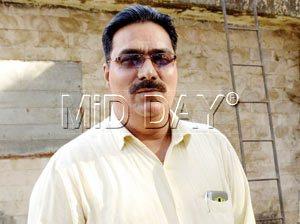
DP Ware
By the time the three-man team was done at the Shivaji Park, Sion, and Reay Road crematoriums and finally reached the one at Worli with the last decomposed body, it was 11.40 pm.
In Mumbai, all unidentified/ unclaimed bodies are to be cremated one at a time only at electric civic crematoriums. Another unwritten rule is that these bodies will be disposed of only after families cremating their dead are done and gone. It takes two hours for a body to be burned completely. Ware and Co have to wait till then.
As though the job itself is not difficult, it comes with added caveats. Chandanwadi crematorium in Marine Lines does not accept unclaimed bodies before 11 pm as it is a VVIP area. Other electric crematoriums have a strange rule that they will accept only one unclaimed body in a day. So, Ware and Co have to go crematoria-hunting till all Hindu bodies are disposed of. Unlike the dead with claimants, who are usually sent off with garlands and prayers, no such rituals are followed for unclaimed bodies.
Bada Kabrastan in Marine Lines and Christian cemeteries ensure the bodies are buried as per tradition, including a maulvi and a priest to say prayers. Proper records are maintained of the body received. Christian cemeteries accept such bodies only between 10 am and 5 pm, and they must be notified in advance. The process of identifying religion is purely by guesswork. Circumcised males are categorised as Muslim. If there is a tattoo of a cross somewhere on the body, it is considered Christian. Some Hindu women from the rural areas have their names tattooed on their hands. Otherwise, the police and mortuary workers look for indents left on forehead by regular application of sindoor/bindi. Once the body is cremated, the original paper is kept with the post-mortem centre where the autopsy was done, and copies are submitted to the concerned police station, and BMC. No death certificate is issued by the BMC until the police trace the next of kin of the unidentified body.
Mumbai's Mr Wolf
The man who drives the hearse is Constable DP Ware. He was relegated to this job in 2006, when he was diagnosed with a life threatening disease.
"A few months after a surgical procedure at a private nursing home in Dadar, I developed loose motions and vomiting. Subsequent blood tests showed I had got an infection during surgery," said Ware.
He was sent to drive the police hearse since he could not perform the regular constable's job, which involves 12 hours of activity including strenuous bandobast and night shift. His wife also tested positive and both have to go to JJ Hospital every week to get their medicines. JJ disburses the crucial medicines under a government programme every Saturday. In the early days, when a superior officer learnt about Ware's ailment, he was not even allowed entry to his cabin. It was hurtful.
"But the worst part is if I miss a Saturday. I am not given medicine for next one month and I cannot afford to buy the medicines I the market. Some concession should be given to policemen on such duties," said Ware.
On March 15, Ware bought a can of deo and emptied it inside the van. By the time the van reached the first crematorium, he was dizzy.
"Two policemen and nine helpers have died in the past. Death in inevitable for the helpers, as they have to lift all sorts of bodies, without realising that the fluid oozing out of decomposed corpses can also be harmful, especially if it comes in contact with an open injury on the helper's body," said Ware.
Ware's only silver lining is that his children have tested negative.
"I want to secure the future of my children. They know that their parents are fighting a life threatening disease and also that I have to transport unclaimed dead bodies," he said. "As a practice, on reaching home, I dump my clothes in washing machine and use soap and hand wash to clean myself. Only then do I enter the house and have a meal or interact with my family."
Inhuman working conditions
Kaniya and Rizwan have been with Ware for five and two years respectively. They get paid Rs 100 for every body disposed. With no safety gear, facemask, apron or shoes, both expose themselves to risk of infection by handling highly decomposed bodies with just a pair of torn gloves. "We collect unclaimed bodies from St George, GT, JJ, KEM, Nair, and Sion hospitals and dispose of them as per the religion of the deceased," Rizwan told mid-day. "Hindu bodies are taken to electric crematoriums, Muslims to Bada Kabrastan and Christians to the cemetry at Mahalakshmi. We are illiterate and have no source of livelihood. By lifting bodies, we can at least feed ourselves for a day," he said.
Kaniya added, "Agar hum ne nahin kiya, toh koi aur nahin karega ye kaam. Hum ise punya ka kaam samajhte hain (If we do not do this, nobody else will. We consider this as a holy work). We have lifted everything from foetuses from dustbins to old people on the road. Initially, we used to get disturbed, but now we are used to it."
The two sit behind Ware, and are so accustomed to the stench that they have even learned to sleep next to decomposing bodies during long hauls. On an average, the trio disposes three to five dead bodies a day. The money they get is barely enough for food and alcohol. And alcohol, they say, is an essential.
"When we are done, we shower in phenyl and soap. We then have our lunch or dinner, which is never on time," said Kaniya. "He (Rizwan) has poor immunity, falls sick often and complains of dysentery and vomiting. We all have to die some day, but the tag of 'unclaimed' or 'unidentified' is something that hurts. When we are born, we acquire an identity. Then why is it that when we are dead, we have none?"
Where is the Rs 1500?
While on paper, the state government vide its notification MIS/0708/P.K. 359/POL-8 dated May 21, 2009 has sanctioned Rs 1,500 for disposal of each body, it's either not reaching sub-inspector level officials or they are unaware of such a notification.
mid-day spoke to a few serving and retired police sub inspectors, who acknowledged and confirmed that disposal of unclaimed/ unidentified body is the responsibility of the sub inspector, who prepares the ADR (Accidental Death Register) and he is also the Investigating Officer. After the mandatory seven days in the mortuary or after receiving intimation from the post-mortem centre, the PSI has to pay a minimum of R300 from his pocket. Of this, R100 is paid to each helper and Rs 100 goes towards the white shroud. "I have to pay from my pocket for disposal of bodies. I have never heard of availability of a fund for disposing unclaimed/ unidentified body," said a sub inspector, who did not want to be identified.
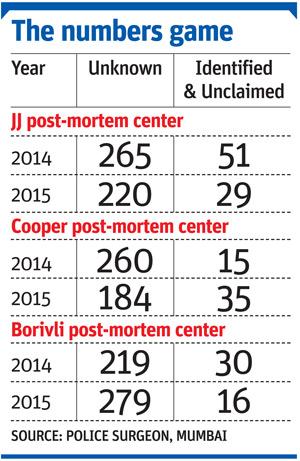
900
Year 2014
767
Year 2015
No. of unclaimed bodies that reached JJ, Cooper and Bhagwati hospitals
How it's done in the United States
The National Institute of Justice's - National Missing and Unidentified Persons System (NamUs; www.namus.gov), is a national centralized repository and resource center for missing persons and unidentified decedent records. NamUs is a free online system that can be searched by medical examiners, coroners, law enforcement officials and the general public from all over the country in hopes of resolving these cases. The public may register to search and report information in the missing person database and may search, but not add, information about unidentified persons. Law enforcement officers, coroners and medical examiners and other professionals may register to search and report information to the missing person database and the unidentified persons database. More than two - thirds of the 10,000 registered NamUs users are members of the general public; the balance are death investigation professionals such as coroners, medical examiners and law enforcement officers. The missing persons database contains 7,148 entries and the unidentified persons database has 7,855 records for year 2011, revealed their press statement.
> NamUs includes three databases:
The Missing Persons Database contains information about missing persons that can be entered by anyone; however before it appears as a case on NamUs, the information is verified. NamUs provides a user with a variety of resources, including the ability to print missing persons posters and receive free biometric collection and testing assistance. Other resources include links to state clearinghouses, medical examiner and coroner offices, law enforcement agencies, victim assistance groups and pertinent legislation.
The Unidentified Persons Database contains information entered by medical examiners and coroners. Unidentified persons are people who have died and whose bodies have not been identified. Anyone can search this database using characteristics such as sex, race, distinct body features and even dental information.
> The Unclaimed Persons Database contains information about deceased persons who have been identified by name, but for whom no next of kin or family member has been identified or located to claim the body for burial or other disposition. Only medical examiners and coroners may enter cases in the unclaimed persons database. However, the database is searchable by the public using a missing person's name and year of birth.
How other Indian states compare
Goa
• Only case of homicidal /accidental/suicidal death, body should be referred for postmortem
• No postmortem required in other cases
• Standing order no 3/96 is followed in case of disposal of unclaimed dead bodies
• Dead bodies to be kept for 72 hours in mortuary
• Request for arrangement for cremation if sent to Municipal authorities
• Body of foreign national preserved for 30 days for informing concerned consulate
Kerala
• Municipal authority is the repository of existing rules for disposal of unclaimed dead bodies
• Police have to complete formalities before handing over to the Municipal Authorities to arrange burial.
Maharashtra
• Unclaimed bodies are disposed of as per the provision laid under section 5 of the Bombay Anatomy Act of 1949, the coroner act got abolished in the year 1999 and now the power is given to the Assistant Commissioner of Police
• The police officer is responsible to ensure that the dead body is covered properly and not exposed to the public view if it is lying in a street or public place
• If police reports that no relatives were traced the police after 7 days are supposed to dispose the dead body
• The postmortem report copy original is kept at the postmortemcenter, copy sent to BMC and police station where Accidental Death registered
Unclaimed bodies for medical education
According to Police surgeon Dr S M Patil, unknown and unidentified bodies are also given to 14 government run and 106 private (including Ayurvedic/homeopathy etc) medical colleges in Maharashtra, only if the Medical Education Department has issued Bombay Anatomy Act 1949 to the said college, and after they obtain a NOC from Assistant Commissioner of Police, who has the magisterial power for obtaining such body. A charge of Rs 1500 per body is levied for embalming the corpse and transportation charges have to be taken care of by medical college. On an average 450 unknown / unidentified bodies are given to medical college not only in Maharashtra but also out of Maharashtra like Bijapur, Pondycherry, Karnatkaetc, which followed Bombay Anatomy Act.
Tamil Nadu allows unclaimed bodies to be kept for 30 days and disposal is done by hospital authorities. Director of Medical Education supplies cadavers to private institutions for Rs 25,000 per body.
Why does Mumbai have so many unclaimed bodies?
When asked the reason for so many unclaimed and unidentified dead bodies, police surgeon Dr SM Patil said, “Metros like Mumbai, Kolkata, Chennai and Delhi witness massive migration of people for search of job and livelihood. Also many intra-state migrations happen due to poverty and drought situations in Maharashtra. Majority of the people engaged as daily wage laborers or as beggars, etc. There is also a huge population of Bangladesh labourers.
“Also most of the time, even if the deceased are identified, the claimants are not keen to come forward and claim the body, as they do not have money for carrying out the last rites, and hence do not turn up. Thus there are no institutional mechanism of keeping records in terms of photo, finger impressions and track on such migrated people in case of death or injuries.”
 Subscribe today by clicking the link and stay updated with the latest news!" Click here!
Subscribe today by clicking the link and stay updated with the latest news!" Click here!






